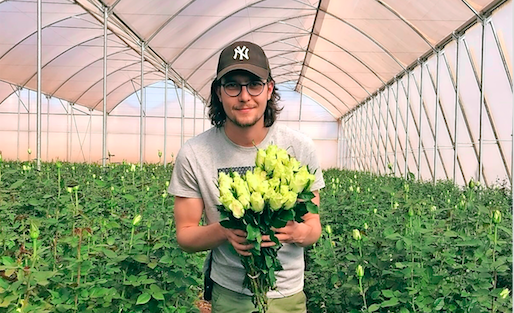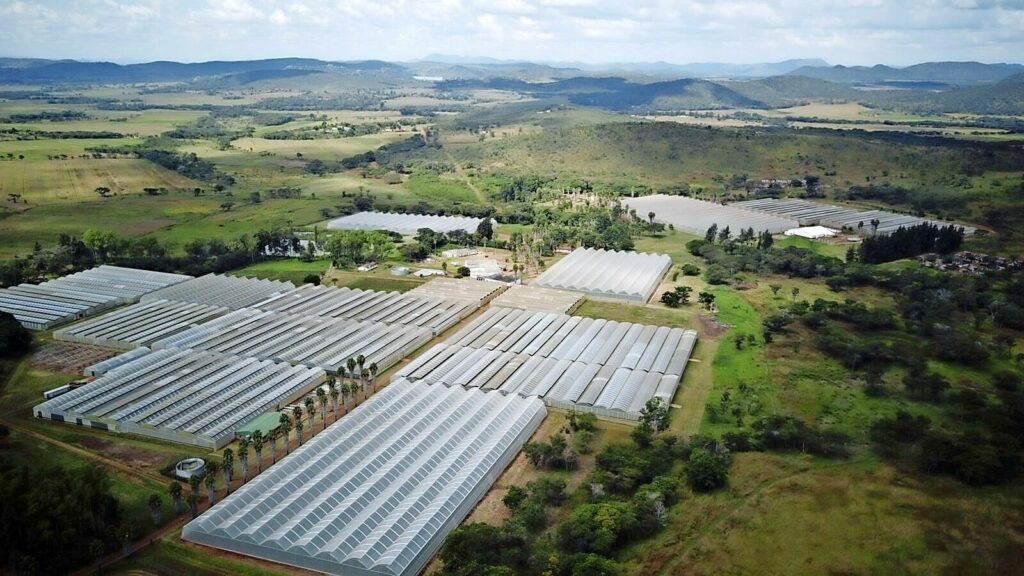Recent weeks have seen alarming reports from Zimbabwe. Severe drought leading to famine and inflation rates as high as in the old days. Fearing unrest, the organisers of HortiFlor Expo decided to postpone the horticultural trade fair. According to rose grower Roelof Nugteren, the drought doesn’t have a huge impact on the large-scale agricultural and horticultural companies.
Recent reports in Dutch newspapers weren’t as mild, though. They mentioned a threat of starvation for 5 million Zimbabweans, almost a third of the entire population, due to severe drought and a lack of drinking water. They also spoke of power shortages. Furthermore, the inflation of the Zimbabwean dollar seemed to be back at a level we all remember from when former dictator Robert Mugabe was in power. It is believed that successor Emmerson Mnangagwa has some of the same traits his predecessor had, as he is banning demonstrations by the opposition.

Not that bad
Fearing unrest in the country two weeks ago, HPP Exhibitions decided to postpone the HortiFlor Expo planned for September to March 2020. Rose grower Roelof Nugteren and his father Aart own nursery Luxaflor Roses in Concession, 45 kilometres north of Harare. Roelof lives at the farm and runs the nursery, while Aart maintains contacts with the government and deals with the market and the company’s growth from the capital.
According to Roelof, things aren’t as bad in Zimbabwe as described in the media. “Zimbabwe always has two months of very hot and dry weather per year. This year is no different. But due to last year’s bad rainy season, we don’t have enough water to generate electricity this year. We’re getting power from South Africa and Mozambique now.”
With regards to the shortage of drinking water, Roelof says: “I know they dug communal wells. The groundwater isn’t deep in Zimbabwe (outside Harare), it’s at 30 to 45 metres. In Kenya for example, you might have to go down to 90 metres and sometimes even to 350 metres. But here, it’s easy to dig a hole for drinking water if there isn’t a borehole yet.”
The Zimbabwean currency has stabilised again, according to Roelof, which has provided the Zimbabweans with new purchasing power. Large maize producers didn’t want to sell their maize during the strong inflation, afraid their money would go up in smoke. Now that the currency has stabilised, they’re selling again.
With regards to the planned demonstrations, Roelof doesn’t feel that’s anything special. “Tell me a place in the world without demonstrations? Think of Hong Kong, France. And do you know of any other place in the world where a dictatorship is overthrown without violence? Zimbabweans aren’t aggressive. They are patient and have a long-term view. I never feel unsafe here.”
Distribution problem
Nugteren believes that the drought did cause problems for smaller farms without an irrigation system. They are located in the rural areas and produce mostly for themselves and a little bit for the market. After the time of land expropriation, nobody invested in these companies. They depend on rainwater and we didn’t get enough of that during the last rainy season. According to Roelof, it doesn’t lead to real food shortages, though. A more limited diet perhaps, yes.

He also points out they do have a distribution problem in Zimbabwe. There is food, but it doesn’t always reach the right places. In the countryside in particular, there are shortages. But in Harare, there’s enough for everybody. Roelof said it’s business as usual there; the shops are well stocked and people are going out for meals. But a trip to the capital to get food supplies is too expensive for most people in the countryside.
Solar panels
Luxaflor (16.5 ha) didn’t experience too many problems due to the drought themselves. Larger agricultural and horticultural companies like Luxaflor have their own water wells to ensure they’ve got enough water for their crops. They continued to produce as normal.
“The only problem we had was a power shortage”, says Roelof. That’s why Luxaflor is investing in 1 ha of solar panels. It will make them much more independent when it comes to power supply. The plan is that the solar panels are going to supply the power required for the cutting tables, pump houses and cold stores.
The expansion which Luxaflor announced at an earlier stage, is going ahead as planned. “The first 6-ha extension of the total of 16 ha planned, and the propagation unit which will supply other companies with plant material, should be finished by the end of December”, says Roelof.
There are four other rose farms in Zimbabwe. Before Robert Mugabe’s disastrous expropriation politics, there used to be many more. Kenya took over from Zimbabwe as the large African flower producer. According to Roelof, his colleagues aren’t building any extensions. However, he has noticed that the acreage of summer flowers has been getting bigger. That doesn’t require the same kind of investment.
Chugging along
Roelof doesn’t expect the desire to invest in the Zimbabwean agricultural sector to go down due to the drought. “It doesn’t really affect big companies like ours. We’ll keep chugging along. But it does have consequences for small companies that don’t invest.”
With regards to the postponement of the trade fair, Roelof feels it’s actually very positive that the fair is taking place in March now. September and October are the driest months, which doesn’t make for a very attractive landscape. “That’s completely different in March, so it’s nice that people get to see that. And postponement doesn’t equal cancellation. I could tell from the list of exhibitors that many companies are returning after last year’s first edition and that there are going to be some new exhibitors as well. The horticultural sector is the smallest agricultural sector in Zimbabwe. There are lots of opportunities. Yes, I’m still very enthusiastic about Zimbabwe and with good reason.”
You can find an earlier article with Roelof Nugteren here.








